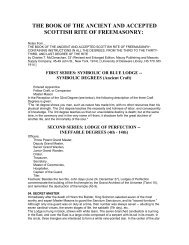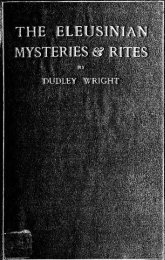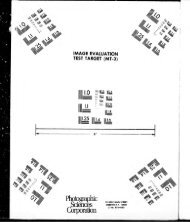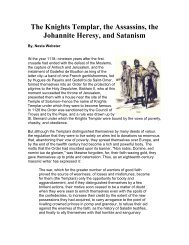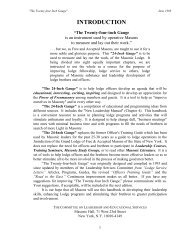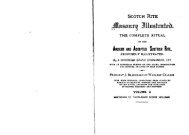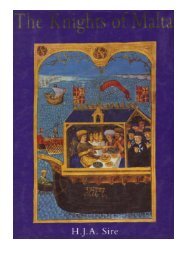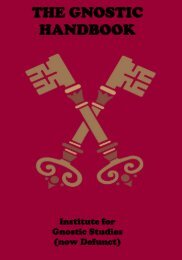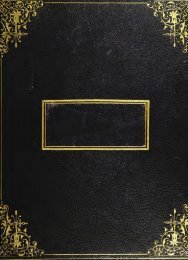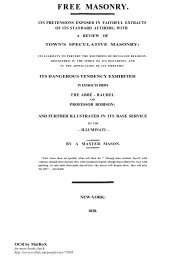The History of Initiation - The Masonic Trowel
The History of Initiation - The Masonic Trowel
The History of Initiation - The Masonic Trowel
Create successful ePaper yourself
Turn your PDF publications into a flip-book with our unique Google optimized e-Paper software.
164<br />
LECTURE X.<br />
HISTORY OF INITIATION INTO THE GOTHIC MYSTERIES.<br />
THE Gothic Mysteries 1 were introduced by Sigge, a<br />
Scythian prince ; who, it is said, abandoned his native<br />
country when it became oppressed by a population too<br />
dense for the comforts and necessities <strong>of</strong> a pastoral life ;<br />
and, with a chosen band <strong>of</strong> followers, wandered in search<br />
<strong>of</strong> another settlement. 2<br />
Travelling to the north-west <strong>of</strong><br />
Europe, he assumed the name <strong>of</strong> Odin, the supreme deity<br />
1 <strong>The</strong> Gothic Mysteries were practised by all the northern nations<br />
<strong>of</strong> Europe. Mr. Turner (Angl. Sax., vol. iv., p. 18) says, "we are not<br />
authorized to ascribe to the Saxon deities the apparatus and mythology<br />
which the northern Scalds <strong>of</strong> subsequent ages have transmitted<br />
to us from Denmark, Norway, and Iceland ;" meaning, undoubtedly,<br />
the mythology <strong>of</strong> the Eddas. I am inclined to think, however, that<br />
the Norwegians, Danes, and Saxons all practised the Gothic superstition,<br />
as it was remodelled by Sigge, who assumed the name <strong>of</strong> Odin a<br />
few years before the birth <strong>of</strong> Christ. This celebrated individual, after<br />
having established himself in Scandinavia, placed his sons in the<br />
territory around him as viceroys, and their respective divisions, after<br />
his death, became independent kingdoms. Suarlami had assigned to<br />
him a part <strong>of</strong> Russia ; Baldeg had Western Saxony, and Segdeg East<br />
Saxony (Mai. North. Ant., vol. i., p. 62) ; and they would, doubtless,<br />
introduce his system <strong>of</strong> Religion amongst their new subjects, because<br />
they had experienced its advantages in enslaving the minds <strong>of</strong> an<br />
ignorant and superstitious people, and placing them implicitly under<br />
the control <strong>of</strong> their superiors. At this period the religion <strong>of</strong> Europe<br />
may be divided into four grand divisions the Roman, the Celtic, the<br />
i<br />
Sclavonian,<br />
they would,<br />
ancient Germans,<br />
Gothic race, pr<strong>of</strong>essed' that system <strong>of</strong> polytheism afterwards' delivered<br />
in the Edda ; and the Franks and Saxons who afterwards settled in<br />
Gaul and Britain, being <strong>of</strong> Gothic race, introduced the polytheism <strong>of</strong><br />
their own nation, which was in general the same with what prevailed<br />
among all the other Gothic or Teutonic people, viz., the Germans.<br />
Scandinavians," &c. (Mai. North. Ant., Intr., vi., Note.)<br />
2 <strong>The</strong> Scythian and Hyperborean doctrines and mythology may be<br />
traced in every part <strong>of</strong> these eastern regions ; nor can we doubt that<br />
Wod or Odin, whose religion, as the northern historians admit, was<br />
introduced into Scandinavia by a foreign race, was the same with<br />
Buddh, whose rites were probably imported into India nearly at the<br />
same time, though received much later by the Chinese, who s<strong>of</strong>tened<br />
his name into Fo. (Asiat. Res., vol. i., p. 425.)



